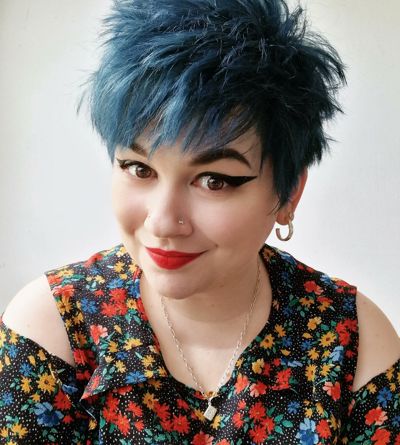"I wasn’t crazy, I was ill" – Nadia’s story
18/03/2024
Nadia reflects on her recent diagnosis of emotionally unstable personality disorder (EUPD). Despite her difficulties with emotional regulation, self-esteem and external stigma, Nadia is finally on the path towards self-acceptance and self-care.
I'm 29 and live in a constant state of feeling as though there is something inherently wrong with me; that I am a bad person. But when I was diagnosed with emotionally unstable personality disorder (EUPD) in 2023, I have grown to realise that the way I think and behave is a reflection of my trauma, and the abusive voice inside my head is a manifestation of that trauma.
I was unfortunate as a child to experience all 10 adverse childhood experiences (ACEs), and as a result I have battled with my emotions ever since. I often dissociate as a response to stress, and can go through derealisation and depersonalisation.
When I experience depersonalisation, it is as though I am outside of my body watching myself. I will often always experience the feeling that my body parts are changing, primarily the feeling that my tongue and hands are shrinking. At the same time, I become more detached and go through derealisation where life feels unreal. I was unable to make sense of myself, attempted suicide on multiple occasions and knew I needed help.
-
To live in a fluctuating state is to suffer continuously over and over again.
I was 19 when I first saw my GP about my mental health. I self-harm as a form of punishment and as a cry for help, and I wanted to discuss this. I also wanted to talk about my chronic feeling of emptiness, my unstable self-image and, if I felt brave enough, my occasional hallucinations and delusions. Unfortunately, this seemed trivial to my doctor at the time and I felt invalidated, reinforcing my feelings of being worthless and burdensome.
I started working within the mental health sector and often find connection with those who have EUPD. Before my diagnosis, I recognised their experiences as something I experience, so I was able to empathise with their struggles and show patience during their dysregulation.
I soon noticed the stigma attached to this diagnosis. I often heard people talk about the emotions displayed as “attention seeking,” making comments about the individual’s unstable state. There is lack of understanding about the symptoms of EUPD and how behaviours, thoughts, and feelings can present. I have had many conversations with people around their disbelief that a person can go from laughing to feeling suicidal within minutes, which has often meant the distress won't be taken seriously.
-
There is an emptiness that feels permanent.
I know from personal experience that during emotional dysregulation, those emotions are very real. To live in a fluctuating state is to suffer continuously over and over again. Going from euphoria to being suicidal as quickly as blinking your eyes. For me, it means wanting to be alive because a movie made me laugh, to not wanting to be here anymore because I’m a terrible person, to then feeling completely ok again. Amongst it all, there is an emptiness that feels permanent.
Living with such extreme emotions means I often experience very intense and unstable relationships and attachments to people. I can go from idealisation to devaluation, with a very black and white way of viewing them.
When I idealise someone, they have zero faults. I put them on a pedestal and it is as though I live for that person. When that person lets me down or changes their tone towards me, I will devalue them, seeing them as entirely bad and push them away. If I get over the devaluation stage, I will do everything I can to make sure that person doesn’t abandon me.
-
I am beginning to let go of the shame I have been carrying.
These splitting behaviours are also evident in people I have worked with, and again have often confused people. But with understanding and providing reassurance to an individual with EUPD, it could help ease the splitting process.
Being emotionally unstable led me to a mental health hospital. For the first time during my diagnosis period, I felt like I wasn't crazy, I was ill. It has taken 10 years to get to this point, but I am beginning to let go of the shame I have been carrying and will soon be starting dialectical behavioural therapy (DBT).
I’ve found that writing helps me, as well as working in mental health. I can focus on others, be an advocate, and share my understanding of EUPD. This gives my life purpose.



